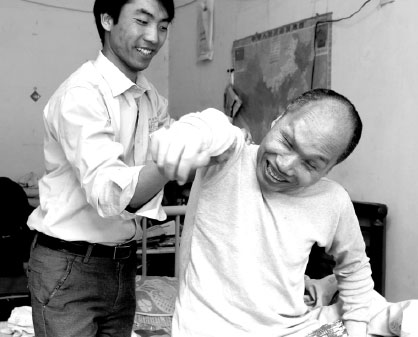Elder care filling a need
In 2010, Zi Nuo was faced with a tough choice.
Her 80-year-old mother was diagnosed with dementia, and Zi, in Zhuhai, Guangdong province, had to decide whether she should send her to a nursing home, or look after the elderly woman by herself.
Not trusting nursing home caregivers, Zi, who was then 49 and widowed, decided to take care of her mother by herself.
It has not been easy.
Zi had to retire early, and her life is centered around her mother - she must watch her 24 hours a day and has little personal space of her own.
Despite this, Zi considers herself lucky.
"I don't need to work for money and can live with her when she is old and needs care," Zi says.
"Not every one has such liberty."
According to the National Bureau of Statistics, China now has more than 200 million people older than 60, and although there are no reliable statistics on "empty-nest" families, many seniors now live apart from their families because of the mobility of modern society.
Yet there are only 5 million nursing home beds across China, despite the total demand being as high as 10 million.
A good nursing home is either very costly or difficult to secure a place in.
In a society where Confucianism is still strong, filial children always want to give the best to their parents, and the elderly also want to reduce the burden on their children.
As old age is associated with declining health and severe disease, how to get good care at home while not placing a burden on their children has become an issue for many Chinese in their twilight years, especially those who have an only child.
Luckily, more services are becoming available to assist the elderly.
In May, Home Instead Senior Care, the world's leading provider of non-medical in-home care services for seniors, announced they would launch a pilot operation to provide in-home personal care and companionship services in Wuhan, Hubei province, in June, and in Shenzhen in the near future.
According to the company's survey in 2013, about 5 percent of the Chinese population could benefit from such in-home senior care services, and at least 13.5 million seniors are extremely likely to use such services.
The most in-demand service would be Alzheimer's and other dementia care, the survey suggests.
Right At Home, another US-based franchiser of home healthcare services for the elderly, has already opened offices in several Chinese cities, including Beijing, Chengdu and Hangzhou.
The two companies all claim their caregivers are carefully selected, and regularly undergo specialized training sessions to meet their clients' needs.
Li Boying, an 87-year-old high blood pressure patient recovering from an oral tumor, lives happily alone in her three-bedroom apartment in downtown Beijing.
She credits her worry-free life to professional in-home caregivers she hires, who are all "young, loving and disciplined professionals".
Li has been living in the neighborhood for decades, and hates the thought of going to a nursing home far away, and not being able to play mahjong with her friends.
She also dislikes living her life supervised, either by nursing home staff members, or by her children who have offered to move in to care for her.
"Different generations have different lifestyles. It is hard to fully understand each other," Li says.
"I guess it is best we keep our distance and enjoy our lives without interfering."
The caregivers clean the house, take her to hospital, remind her to take medication, accompany her when she desires, and even make handicraft for her.
When she had a tumor removal operation, a caregiver accompanied her for eight days in the hospital, and took care of everything, Li says.
"These girls and boys are very different from live-in nannies. They are pro-active," Li says.
Nannies are usually middle-aged women with little education, and you can only rely on luck to get a good one, Li adds.
But such services cost money. Depending on the required level of care and duration, fees for the service range from about 4,000 yuan ($640) a month for basic companion-care services to about 10,000 yuan for extended care.
The government doesn't yet provide health insurance coverage for such services.
Zhou Yanmin, a professor at Tsinghua University's architecture school, also suggests people adopt deigns that make houses or apartments easier to use for the elderly, such as wide doors for a wheelchair to go through, or handles on bathroom walls to help keep balance.
After all, as communities and homes are where most people spend their last years, it is important to cater for them.
liuzhihua@chinadaily.com.cn
|
Luo Wei gives in-home service to a paralyzed resident in Beijing. Paker Zheng / China Daily |



















